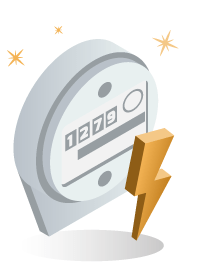Smart Meters Explained

Over 50 million of them are installed in homes and businesses across the US. But what are smart meters, how do they work, and are they safe?
What is a Smart Meter?

A smart meter works similarly to a regular electromechanical (analog) meter, in that it measures the consumption of electricity used by your household as it passes into your home. All types of meters, whether "smart" or "simple" perform the same basic function as the mileage display in your car that shows you the total distance your car has traveled; they display the total amount of power (measured in kilowatt-hours) that has been used since they were installed, and are constantly working.
All types of meters perform the same function and include the same basic components:
- A display of total electricity consumption
- A unique meter number that is used to identify your consumption
It's a good idea to write down your meter number to have it on hand in case you have ever have a concern about billing, or if you decide to switch suppliers
The difference between a conventional meter and a smart meter is that smart meters are equipped with a battery and a communication chip so that they can send electronic meter readings to the utility automatically.
How does it work? The communication chip sends meter reading data by radio signal to a mobile collector several times of day (it rests dormant between these times). This meter reading information is sent to the electric utility through the power lines or by radio frequency or cellular networks. The electric utility sends customer consumption information to their energy supplier for billing.
The advantage of smart meters is that they enable precise and accurate measurements of your electricity usage. There's no need for you or a meter reader to take a reading every month, nor is there a need for the utility to estimate your monthly consumption if they can't access your meter for a reading in time. What's more, smart meters are able to capture and record real-time data about your energy use, making different electricity systems such as time of use pricing possible.

Pricing based on the time-power is used is a more accurate reflection of the true cost of electricity, and can help you pay the most accurate price for your power usage. Having this kind of real-time data can give you some ideas about how to be more efficient with your energy use, helping you save money on your electricity bills.
Smart meters also help cut down on your utility's costs, as they can save money in operating and labor costs. They can also help utilities respond to power outages faster. While smart meters alone don't constitute a smarter grid, they are a fundamental component of it.
However, smart meters have not been without some controversy. Most concerns focus on safety concerns, privacy, or how smart meter implementation is handled.
Smart meter health and safety concerns
Some people are concerned with the health effects of the RF radiation that smart meters emit. However, this type of radiation is low-energy radiation, which means it has enough energy to move atoms in a molecule around or cause them to vibrate and can lead to heat, but not enough energy to damage DNA directly.
While RF radiation is classified as "possibly carcinogenic to humans" (based on the finding of a of a possible link between cell phone use and a specific type of brain tumor in at least one study), the American Cancer Society states: "[it would be] nearly impossible to conduct a study to prove or disprove a link between living in a house with smart meters and cancer because people have so many sources of exposure to RF and the level of exposure from this source is so small".
There are a few things to keep in mind about the radiation that smart meters emit for those who are worried about their health. First, the emissions from a smart meter are less intense than the emissions from a microwave oven. Also, as your meter is typically installed outside your home, they are much farther away than other possible sources of RF radiation (such as cell phones or cordless phones), and are to some extent blocked by the walls of your home as well. Smart meters typically send and receive short messages about 1% of the time that they are running. This means that the amount of RF exposure from smart meters is probably a lot lower than possible exposure from other sources.
Some have also expressed concerns that smart meters might interfere with electronic medical devices, such as heart pacemakers, but a study that examined the effect of smart meters on pacemakers and implantable defibrillators found that the smart meters did not interfere with these devices.
Smart meters and privacy
Greater accuracy and data about electricity consumption, along with having that consumption constantly monitored, also raises concerns about privacy. Who has access to all of this information, and what they will do with it is a major concern for many people. If you are concerned with how your data will be stored and if it will be shared, you should contact your utility to find out their privacy policy regarding the information they collect from consumers.

Can your smart meter be hacked?
While no widespread hacking incidents have happened in the United States, two independent researchers were able to hack and under-report electricity usage for smart meters in Spain. That being said, utilities typically encrypt smart meter communication data, meaning that it is sent to the utility securely.
Smart meter roll-outs
These days, most concerns about smart meters focus more on how they are deployed. While many utilities have been able to take advantage of federal assistance in upgrading their meter systems to smart meters, it typically costs a utility several hundred millions of dollars install smart meters. This cost is passed along to the consumer in the form of higher delivery charges. However, customers can also save money from being billed more accurately and improving their energy efficiency.
Many states allow consumers the opportunity to opt-out of a smart meter, if they don't want one. However, this usually comes at a price - in Texas, for example, it can cost more than $800 to replace a smart meter with a traditional analog one.
Not sure if you have a smart meter or a conventional one? Check with your utility to find out
Smart meters are the future
However you feel about them, smart meters are here to stay. One thing we like about them is that they open up your electricity pricing options, helping you find the rate type that works best for you, and the rate that saves you money.